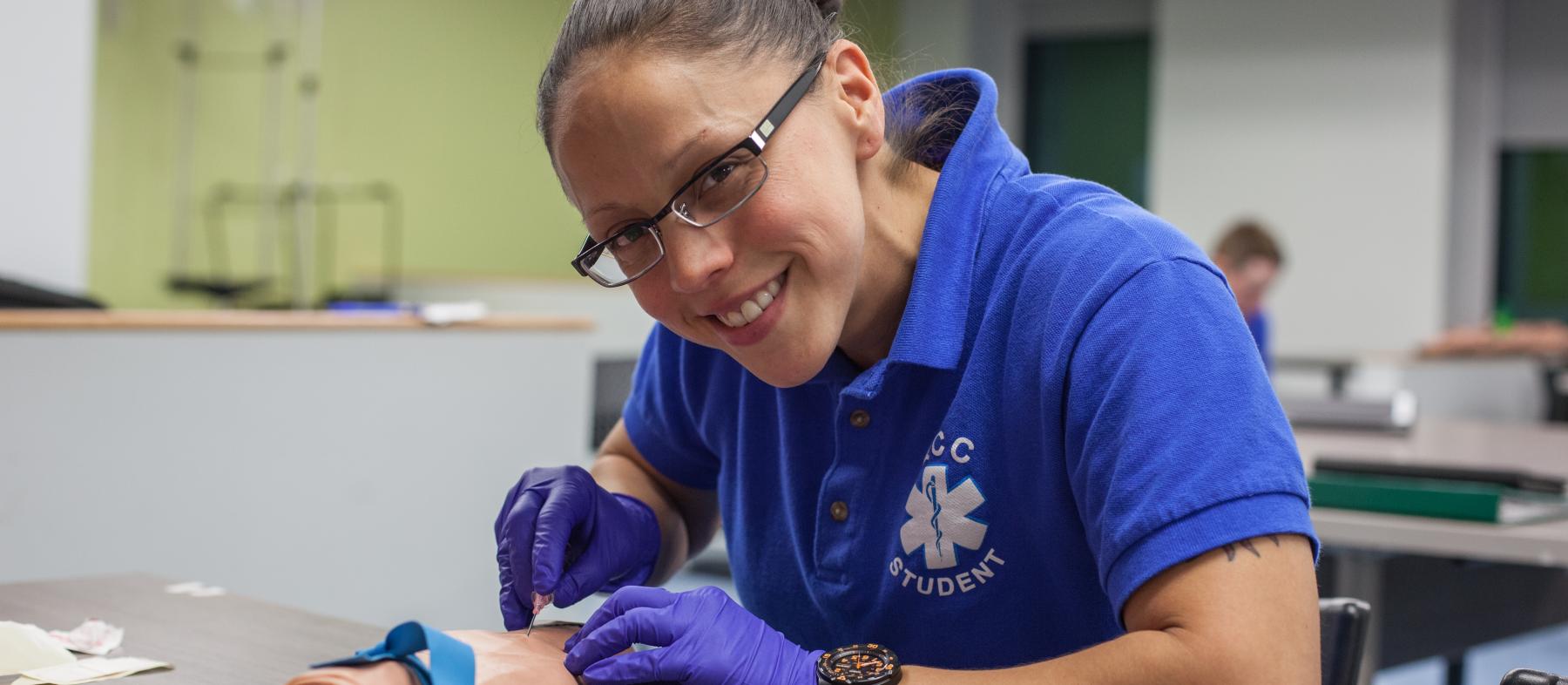Program Goals:
The Phlebotomy/EKG Technician - Direct Entry Certificate educates individuals to work in various aspects of healthcare, including hospitals, clinics, and outreach/home sites.
Student Learning Outcomes:
Upon completion of the program, graduates will be able to:
- Understand medical terminology, basic anatomy of the venous system, basic hematology, infection control, quality assurance, and safety.
- Perform venipuncture, capillary puncture, and specimen handling.
- Gain knowledge of basic EKG tracing, rate, rhythm, common heart abnormalities, and the use and function of the EKG machine.
Admissions Process:
Admissions inquiries should be directed to admissions@qcc.mass.edu. Prospective students may apply to the program of their choice by following the enrollment steps at www.QCC.edu/enrollment-steps.
Program Admissions Requirements:
Students should note that some first semester courses carry minimum prerequisites. Refer to the program grid.
- High School Diploma or GED/HiSET.
- Must show evidence of being compliant with the immunization requirements specified by the Massachusetts Department of Public Health. Additional immunization requirements will be required for clinical experiences.
CORI, SORI, Finger Printing & Drug Testing:
Criminal Offender Record Information (CORI), Sex Offender Registry Information (SORI), and National Background checks are required in the program, either annually or every semester. Fingerprinting and drug testing may be required. Fingerprinting and drug testing results must meet clinical requirements. An issue with CORI/SORI, National Background, fingerprinting and/or drug testing could prevent a student from participating in a clinical/field rotation, which could result in dismissal from the program.
Additional Cost:
See the Program Fees page.
- Students should anticipate additional expenses for clinical uniforms, clinical parking fees, and materials required in the program.
Technical Performance Standards:
See the Technical Performance Standards page. (Note: Not all programs have technical performance standards).
- The QCC Phlebotomy/EKG Technician program is deeply committed to diversity and fostering an inclusive environment that represents the diverse population of healthcare professionals. We value the uniqueness and potential of every learner and strive to create a culture of respect and equality, welcoming all students, including individuals with disabilities. We encourage students with disabilities to disclose their needs and seek accommodations to fully engage in our program. All disability-related conversations and requests are handled through a confidential process to protect the privacy of our students. After reviewing the Technical Performance Standards, students who have questions about accommodations should contact QCC Student Accessibility Services as soon as possible. Given the complexities of clinical-based programs, additional time may be needed to effectively implement accommodations.
- For more information, contact QCC Student Accessibility Services:
Credit for Prior Learning:
Credit for Prior Learning (CPL) allows students to use skills they already have towards a college degree or certificate. Work, life, volunteer and military experience may be translated into credit, allowing students to take fewer classes and earn their degree faster. CPL eliminates redundancies for students who have already earned credentials or mastered skills required for their program of study. Email experience@qcc.mass.edu for more information and eligibility.
Career Outlook:
Please consult the Massachusetts Career Information System at https://masscis.intocareers.org/ or the Occupational Outlook Handbook at www.bls.gov/ooh/ for specific occupational information. The CIP code for this program is 51.1009.
Transfer Articulations & Opportunities:
Prospective students may learn more about transfer articulation agreements at www.QCC.edu/agreements. More information regarding transfer opportunities is available at www.QCC.edu/transfer.
Additional Information:
- Students accepted into the Phlebotomy/EKG Technician - Direct Entry Certificate must:
- Provide documentation of immunization currency and satisfactory health status, and must submit evidence of a positive Hepatitis B antibody titer prior to beginning the clinical externship; this is a six month process.
- Meet the health requirements as identified on the QCC Health Form; these documents must be submitted by first day of semester enrolled in ALH 125. Students who have not been cleared will not be allowed to participate in the clinical externship, and may necessitate withdrawal or course failure.
- Take the College Placement Test to determine mathematics and English levels, if no college level courses were previously completed.
- This is a great opportunity for students to gain entry-level employment in the healthcare field prior to matriculating into a selective program.
- Students will increase their chances of obtaining employment by completing the theoretical and clinical externship course (ALH 125).

